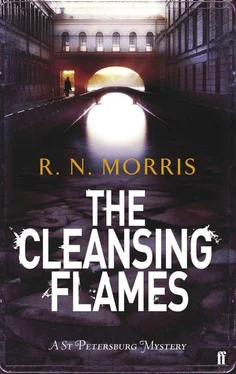R. Morris - The Cleansing Flames
Здесь есть возможность читать онлайн «R. Morris - The Cleansing Flames» весь текст электронной книги совершенно бесплатно (целиком полную версию без сокращений). В некоторых случаях можно слушать аудио, скачать через торрент в формате fb2 и присутствует краткое содержание. Год выпуска: 2011, ISBN: 2011, Издательство: Faber and Faber Fiction, Жанр: Исторический детектив, на английском языке. Описание произведения, (предисловие) а так же отзывы посетителей доступны на портале библиотеки ЛибКат.
- Название:The Cleansing Flames
- Автор:
- Издательство:Faber and Faber Fiction
- Жанр:
- Год:2011
- ISBN:0571259154
- Рейтинг книги:5 / 5. Голосов: 1
-
Избранное:Добавить в избранное
- Отзывы:
-
Ваша оценка:
- 100
- 1
- 2
- 3
- 4
- 5
The Cleansing Flames: краткое содержание, описание и аннотация
Предлагаем к чтению аннотацию, описание, краткое содержание или предисловие (зависит от того, что написал сам автор книги «The Cleansing Flames»). Если вы не нашли необходимую информацию о книге — напишите в комментариях, мы постараемся отыскать её.
The Cleansing Flames — читать онлайн бесплатно полную книгу (весь текст) целиком
Ниже представлен текст книги, разбитый по страницам. Система сохранения места последней прочитанной страницы, позволяет с удобством читать онлайн бесплатно книгу «The Cleansing Flames», без необходимости каждый раз заново искать на чём Вы остановились. Поставьте закладку, и сможете в любой момент перейти на страницу, на которой закончили чтение.
Интервал:
Закладка:
‘Whom did they call upon?’
‘That doesn’t matter. In truth, I don’t know. Naturally. That is the way the central committee works.’
‘Totsky?’
‘There are others. There are many. From time to time, the central committee employs all manner of individuals to do its bidding. Not all are especially motivated by political convictions. Some carry out such deeds for money. Others simply because it is in their natures to destroy — the central committee finds a way to direct their destructive tendencies. There have been common criminals, escaped convicts, used in this way. My guess is that this was the case with Kozodavlev.’
‘And Pseldonimov?’
‘Pseldonimov was different.’
‘In what way?’
‘Pseldonimov died. . so that the group might become stronger. It was not true that he was a threat to us. At least I do not believe so. Dyavol had become tired of him — that certainly was true. We needed him to get the printing press. But once that was acquired, we no longer needed him. Of course, there was a danger that he might betray us. There is always that danger, with every one of us. But it was rather the case that Dyavol saw that he would be more useful to the group dead than alive.’
‘I don’t understand.’
‘He would serve to bring the group together. To bind us to one another.’
‘In what way?’
‘Because we would all have a part in killing him. No one man — or woman — could be said to be responsible for his death. We were all equally culpable. One enticed him. One put him at his ease. One held him. One tied the ropes. One tightened the gag. One kept lookout. One shot him. All conspired to dispose of the body. And now we all have this hold over one another. And it is our mutual fear and suspicion that binds us together. Rather brilliant, don’t you think?’
Virginsky thought back to Pseldonimov’s body on Dr Pervoyedov’s trestle table. ‘He was a Jew. Did that make it easier?’
Botkin shrugged, as if the question was of no importance.
‘You said woman? There was a woman involved?’
‘Of course.’
‘Tatyana Ruslanovna?’
‘Of course.’
‘Who else?’
‘You can work it out, can’t you?’
‘You. Dolgoruky. Totsky. Kozodavlev?’
‘Correct. So far. But you are forgetting someone.’
‘Dyavol.’
‘Of course.’
‘Sometimes it seems to me that Dyavol is the central committee. That everything you do is decided by this individual. Are you sure this is wise? It certainly does not seem democratic, no more democratic than the Tsar.’
‘Men like Dyavol are necessary.’
‘Unlike Pseldonimov.’
‘Pseldonimov served his purpose.’
‘Who is Dyavol?’
‘Ah, that you shall not know. Unless Dyavol himself wishes you to.’
‘But you know his identity? You have met him?’
One side of Botkin’s mouth shot up and his eyelids fluttered closed in an expression of serene complacency. ‘I have been granted that privilege.’ He now fixed Virginsky with a look charged with contempt, which was possibly as close as Botkin was capable of approaching pity.
*
Virginsky lost all track of the days. It was not simply that the newspapers were kept from him. Ever since he had fled Porfiry’s chambers, he had felt himself severed from the ordinary flux of time that ruled his fellow men, giving direction to their lives and binding them one to another on the diurnal treadmill. He had entered another realm, where the moments were measured by the throbbing of his pulse, by the flickering processions of his snatched and anxious dreams and by the infinitely slow growth of his beard. There was a fisheye looking glass in the room. One day he looked up at it and saw a man he did not recognise staring back at him. He knew then that a considerable number of days must have passed.
At times he was beset by a quaking terror, convinced that Botkin would come for him at any moment, taking him to a desolate spot on the edge of the city, some blasted wasteland strewn with rubbish, overgrown with dingy weeds. And there, alone, weeping like a girl, begging shamelessly for his life, revealing himself at last to be the coward he had always known he was, he would stare down the barrel of his killer’s gun.
Some days Kirill Kirillovich sat with him, some days Totsky. He was never left alone with Botkin again, who perhaps now regretted all that he had divulged to Virginsky. There was also the possibility that others had decided that Botkin could not be trusted. Neither Totsky nor Kirill Kirillovich addressed a word to him, or responded in any way to the questions he asked.
Even when he shouted into Totsky’s face, ‘Surely this must be driving you insane!’ the young radical barely blinked. Virginsky was driven to torturing himself by making speculative remarks about Totsky’s relationship with Tatyana Ruslanovna. He felt sure that they must be lovers. He was inhibited from stating his fears so baldly by the possibility that they might prove founded. Totsky’s silence was infuriating, but in this case it was possibly better than a definite answer. At one time, Virginsky imagined he saw confirmation of one of his more daring insinuations in the curling of a lip and the flood of colour to the cheeks. He was tortured then by jealousy and despair, at which point the realisation hit him that he was in fact in love with Tatyana Ruslanovna. He reeled, as if from a physical blow. The realisation was not a happy one. If anything, he was more devastated after it struck him than before. It was more than likely that Tatyana Ruslanovna was one of those conspiring to kill him. To say that he was afraid his feelings would not be reciprocated was an understatement. On the other hand, it was perhaps equally true that he was conspiring in her arrest. At this moment, however, none of that seemed to matter anymore. All that he wanted was to live, and to be with her. He would have sworn allegiance to any cause, and meant it, to make that possible.
Now it was even harder for him to keep his bearings amid the staggering past of the hours. Varvara Alexeevna came and went; when she was not in the stagnant apartment, she was bringing new life into the teeming world. Food was prepared, and he was allowed to share in it. The curtains were kept closed at all times, to prevent him from communicating with anyone in the courtyard, even by looks and gestures.
And so he could not say with any certainty when it was, or how long after that momentous day when he had levelled a gun at Porfiry Petrovich, that Tatyana Ruslanovna came into the apartment and relieved Kirill Kirillovich from the unrewarding task of watching him. He noticed that she was wearing coarse peasant clothes that did not seem to fit her properly, as if they belonged to someone else. In all likelihood, she wore them to look more like one of the people. However, the ill-fitting clothes only emphasised her individuality, at the same time distancing her from the class she sought to assimilate. To Virginsky, she looked like a child dressing up. He found the effect of her clothes inexpressibly touching.
‘They will not speak to me,’ he said, as soon as they were alone.
But she did not speak to him either. She pulled him to her and closed her lips around his, just as he was forming the first of the questions floating into his consciousness. The breath went from him, so completely that it seemed she must have sucked it out of him. His heart was in spasm; he felt it thrashing like a fish stranded on the bank.
He gasped for air as she released him. Her gaze shone with admiration and — dare he say it? — love. His own gaze back was questioning.
‘He’s dead!’ she explained. ‘Your magistrate died. They published an obituary in the paper. And a date has been announced for his funeral. It seems you really killed him.’
Читать дальшеИнтервал:
Закладка:
Похожие книги на «The Cleansing Flames»
Представляем Вашему вниманию похожие книги на «The Cleansing Flames» списком для выбора. Мы отобрали схожую по названию и смыслу литературу в надежде предоставить читателям больше вариантов отыскать новые, интересные, ещё непрочитанные произведения.
Обсуждение, отзывы о книге «The Cleansing Flames» и просто собственные мнения читателей. Оставьте ваши комментарии, напишите, что Вы думаете о произведении, его смысле или главных героях. Укажите что конкретно понравилось, а что нет, и почему Вы так считаете.












